Abstract
Alcaligenes eutrophus was grown autotrophically in 23-liter batch cultures in a controlled H2-O2-CO2 atmosphere. It was demonstrated that the need for periodic supplements of individual nutrients could be anticipated before cell growth depleted these nutrients to the point of becoming growth rate limiting. As a result, exponential growth was extended to optical densities of 44, with doubling times maintained at 2 h. Cultures having an initial optical density of 0.040 to 0.70 reached the final optical density of 60 in about 25 h. The final viable count was 1.2 X 10(11) cells per ml, and the dry weight was 25 g/liter.
Full text
PDF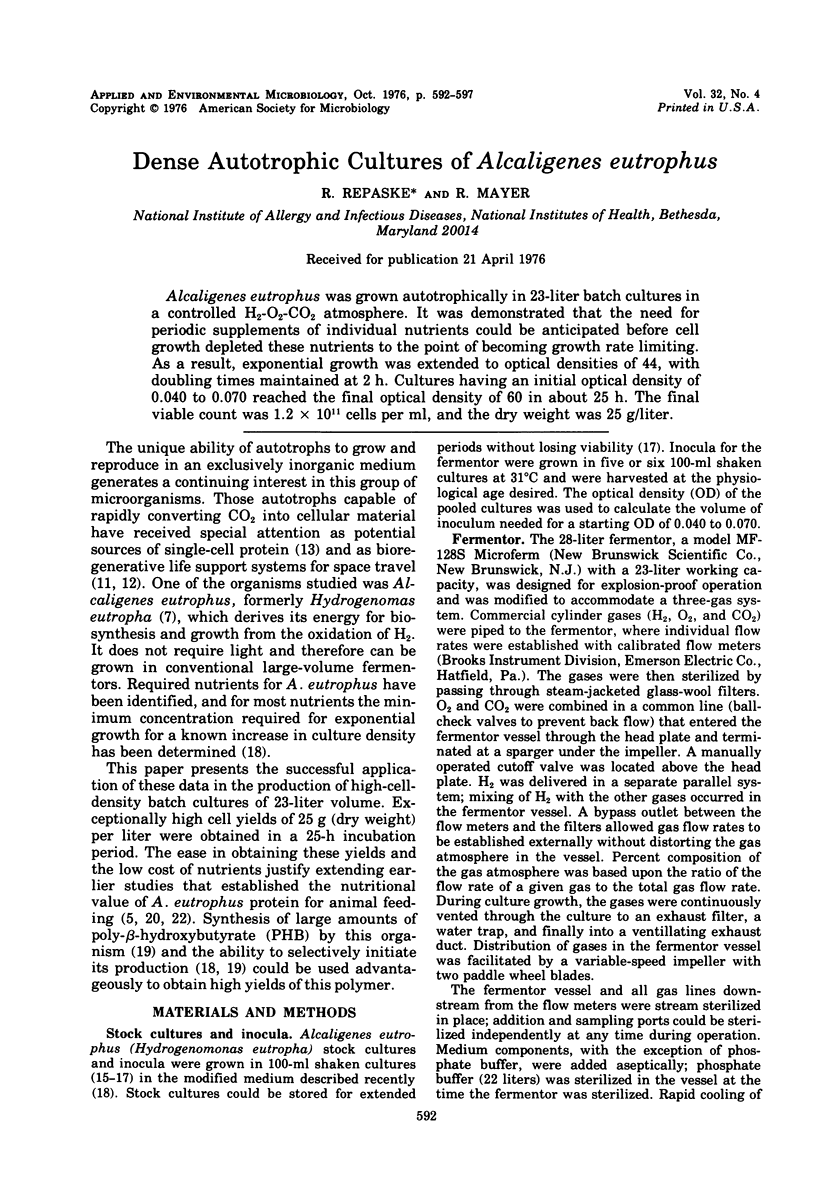
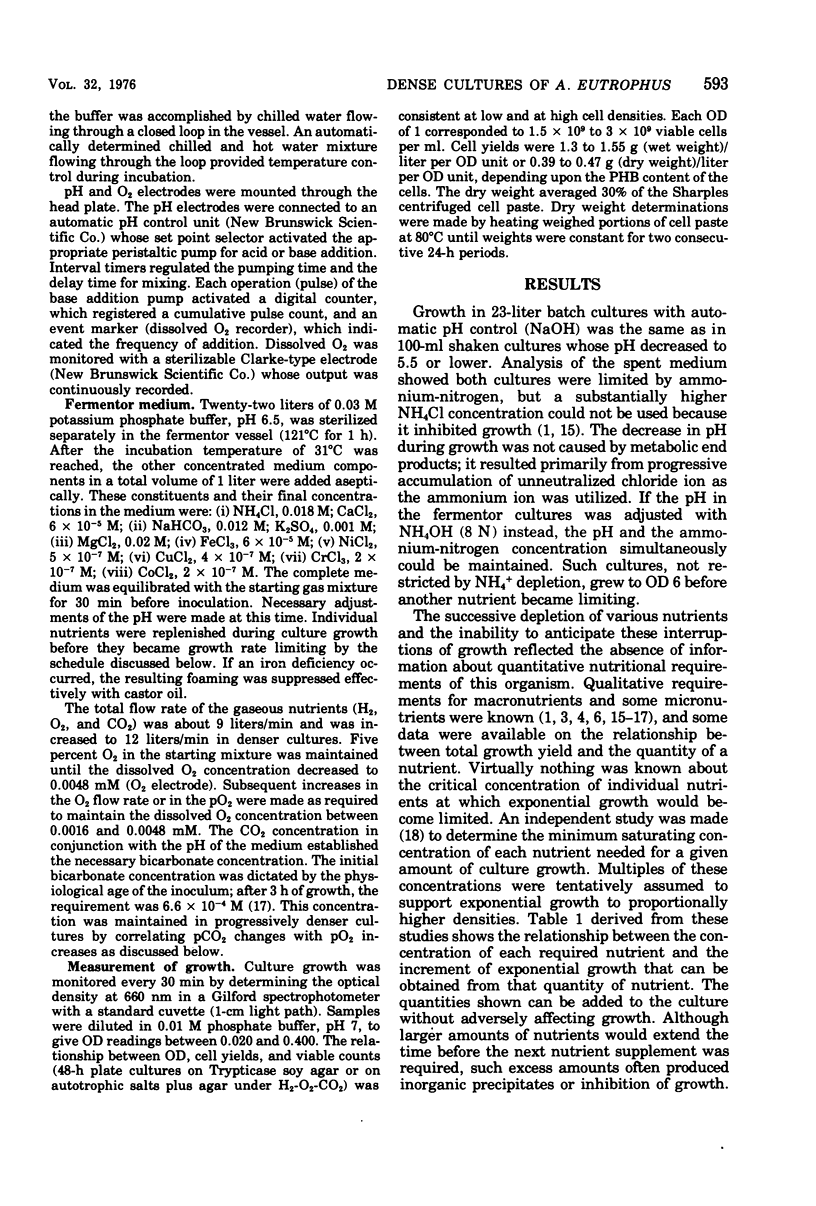
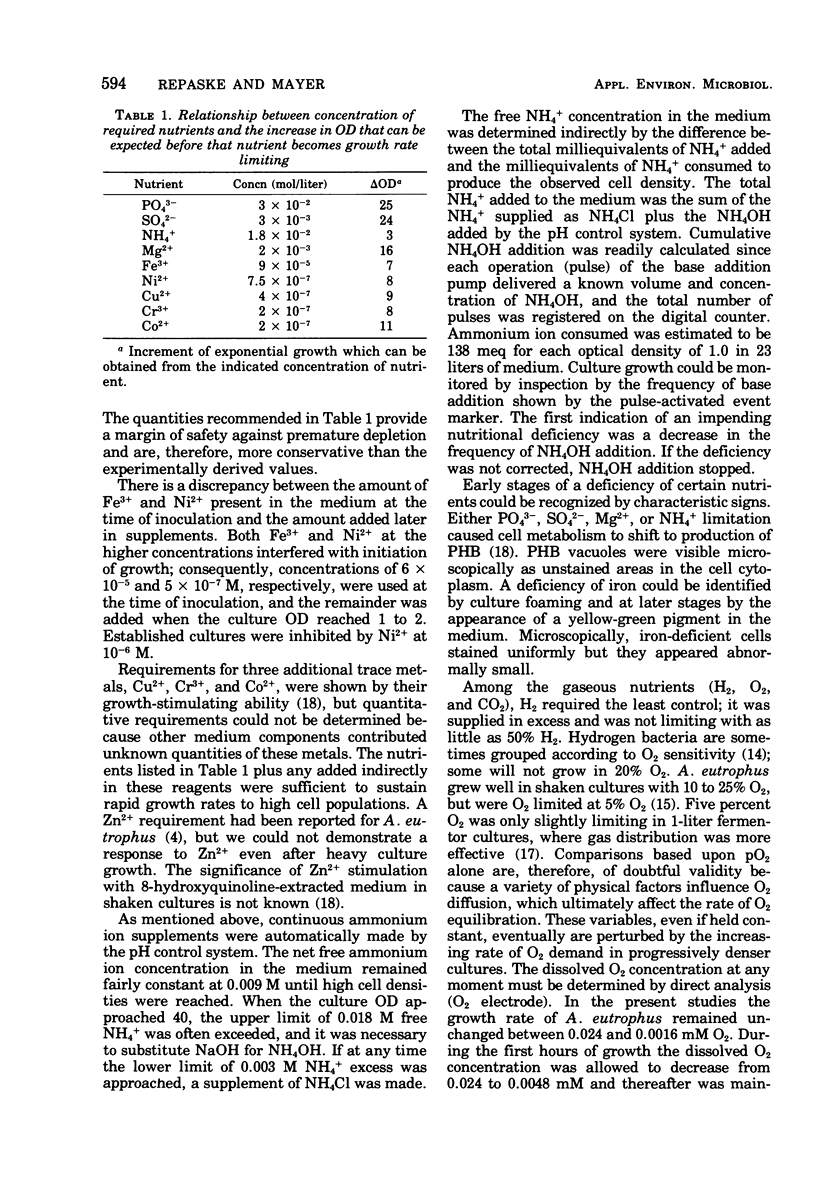
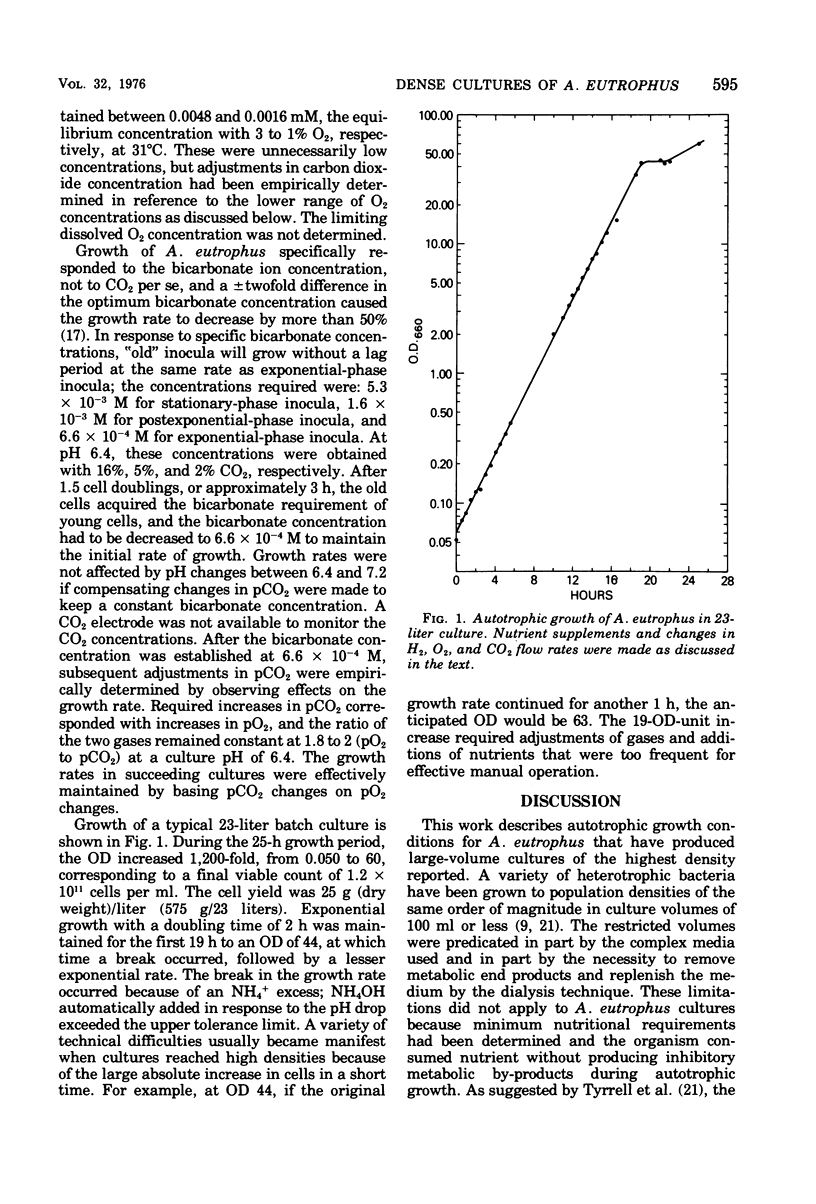
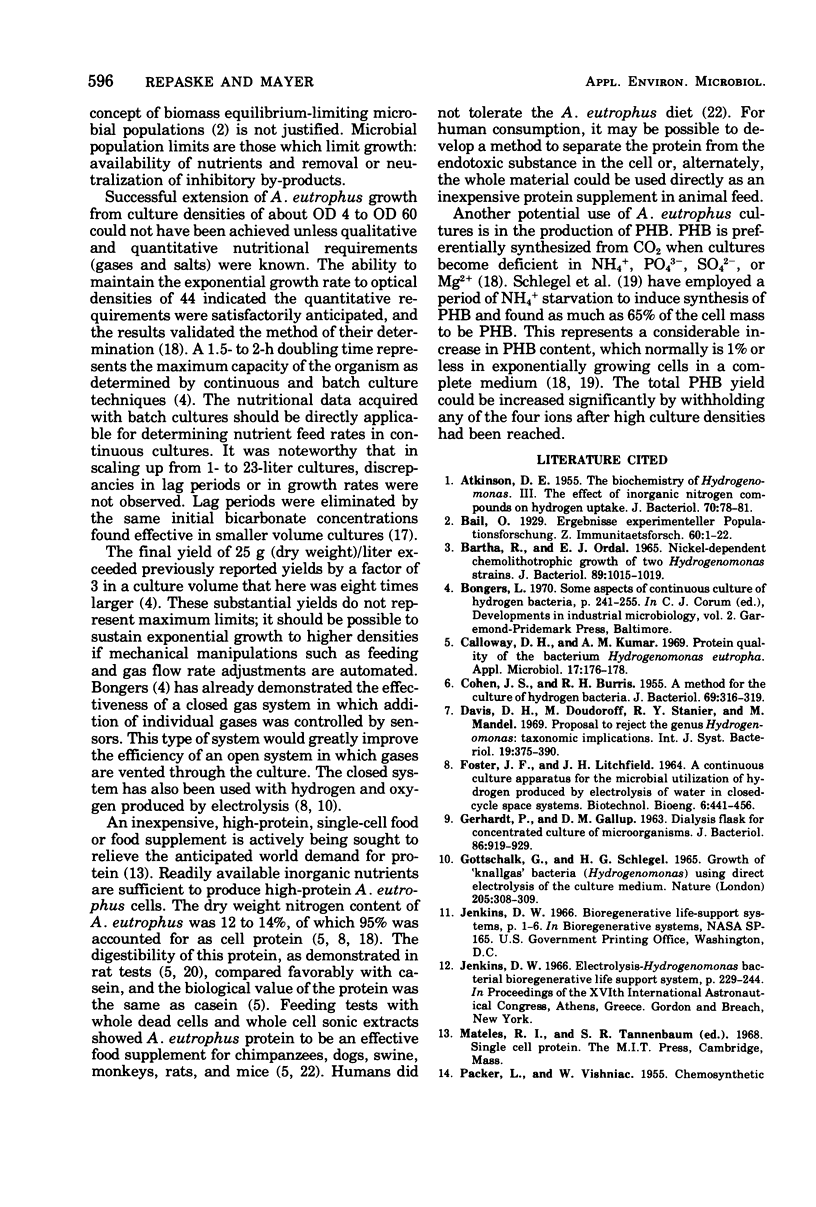

Selected References
These references are in PubMed. This may not be the complete list of references from this article.
- ATKINSON D. E. The biochemistry of Hydrogenomonas. III. The effect of inorganic nitrogen compounds on hydrogen uptake. J Bacteriol. 1955 Jul;70(1):78–81. doi: 10.1128/jb.70.1.78-81.1955. [DOI] [PMC free article] [PubMed] [Google Scholar]
- BARTHA R., ORDAL E. J. NICKEL-DEPENDENT CHEMOLITHOTROPHIC GROWTH OF TWO HYDROGENOMONAS STRAINS. J Bacteriol. 1965 Apr;89:1015–1019. doi: 10.1128/jb.89.4.1015-1019.1965. [DOI] [PMC free article] [PubMed] [Google Scholar]
- COHEN J. S., BURRIS R. H. A method for the culture of hydrogen bacteria. J Bacteriol. 1955 Mar;69(3):316–319. doi: 10.1128/jb.69.3.316-319.1955. [DOI] [PMC free article] [PubMed] [Google Scholar]
- Calloway D. H., Kumar A. M. Protein quality of the bacterium Hydrogenomonas eutropha. Appl Microbiol. 1969 Jan;17(1):176–178. doi: 10.1128/am.17.1.176-178.1969. [DOI] [PMC free article] [PubMed] [Google Scholar]
- GERHARDT P., GALLUP D. M. DIALYSIS FLASK FOR CONCENTRATED CULTURE OF MICROORGANISMS. J Bacteriol. 1963 Nov;86:919–929. doi: 10.1128/jb.86.5.919-929.1963. [DOI] [PMC free article] [PubMed] [Google Scholar]
- PACKER L., VISHNIAC W. Chemosynthetic fixation of carbon dioxide and characteristics of hydrogenase in resting cell suspensions of Hydrogenomonas ruhlandii nov. spec. J Bacteriol. 1955 Aug;70(2):216–223. doi: 10.1128/jb.70.2.216-223.1955. [DOI] [PMC free article] [PubMed] [Google Scholar]
- REPASKE R. Nutritional requirements for Hydrogenomonas eutropha. J Bacteriol. 1962 Feb;83:418–422. doi: 10.1128/jb.83.2.418-422.1962. [DOI] [PMC free article] [PubMed] [Google Scholar]
- Repaske R., Ambrose C. A., Repaske A. C., De Lacy M. L. Bicarbonate requirement for elimination of the lag period of Hydrogenomonas eutropha. J Bacteriol. 1971 Sep;107(3):712–717. doi: 10.1128/jb.107.3.712-717.1971. [DOI] [PMC free article] [PubMed] [Google Scholar]
- Repaske R., Repaske A. C. Quantitative requirements for exponential growth of Alcaligenes eutrophus. Appl Environ Microbiol. 1976 Oct;32(4):585–591. doi: 10.1128/aem.32.4.585-591.1976. [DOI] [PMC free article] [PubMed] [Google Scholar]
- SCHLEGEL H. G., GOTTSCHALK G., VON BARTHA R. Formation and utilization of poly-beta-hydroxybutyric acid by Knallgas bacteria (Hydrogenomonas). Nature. 1961 Jul 29;191:463–465. doi: 10.1038/191463a0. [DOI] [PubMed] [Google Scholar]
- Shapira J., Mandel A. D. Nutritional evaluation of bacterial diets in growing rats. Nature. 1968 Mar 16;217(5133):1061–1062. doi: 10.1038/2171061a0. [DOI] [PubMed] [Google Scholar]
- TYRRELL E. A., MACDONALD R. E., GERHARDT P. Biphasic system for growing bacteria in concentrated culture. J Bacteriol. 1958 Jan;75(1):1–4. doi: 10.1128/jb.75.1.1-4.1958. [DOI] [PMC free article] [PubMed] [Google Scholar]
- Waslien C. I., Calloway D. H., Margen S. Human intolerance to bacteria as food. Nature. 1969 Jan 4;221(5175):84–85. doi: 10.1038/221084a0. [DOI] [PMC free article] [PubMed] [Google Scholar]


